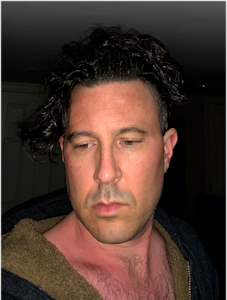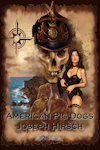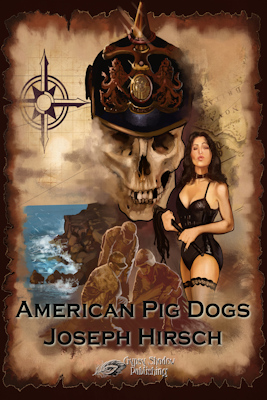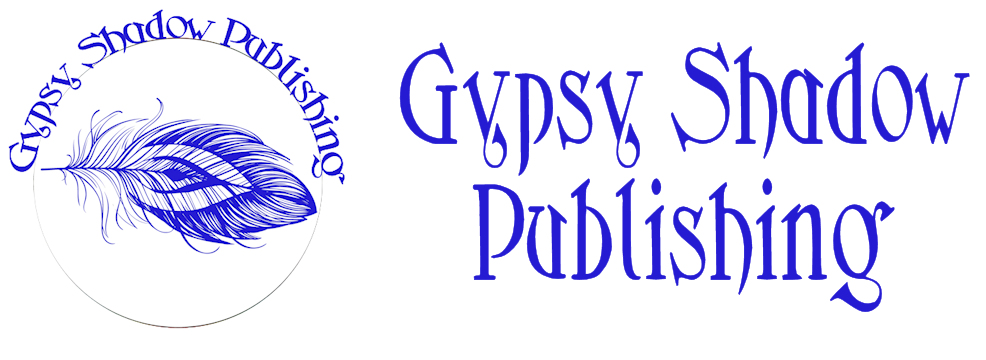Joseph Hirsch
 |
Joseph Hirsch is the author of many published books, short
stories, novellas, poems, essays, and articles. He served four
years in the U.S. Army, where his travels took him to Iraq,
Germany, and Texas. He holds an MA in Germanistik from the
University of Cincinnati, and can be found online @
www.joeyhirsch.com
https://www.joeyhirsch.com/blog
https://www.goodreads.com/author/show/2784412.Joseph_Hirsch
|
New Title(s) from Joseph Hirsch

Click on the thumbnail(s) above to learn more about the book(s) listed.
 |
It’s the 80s and the Cold War is at full
freeze, and that freeze is pretty literal for Corporal Chris
Talworth and his two friends, Private Legg and Specialist
Jablonski. They have been tasked with the mundane job of
guarding a Christmas fair in the sleepy village of Langemarck.
It should have been an easy (albeit cold) gig, but then Fate
throws them a curveball and they find themselves in deep
trouble, not to mention probably stripped of rank and
dishonorably discharged from the Army.
Their only hope at this point--and it’s a longshot--lies with an
ancient map one of them found while on field maneuvers. It may
lead to untold riches. Or deep into the bowels of the Abyss.
Excerpt
Word Count: 40331
Buy at:
Smashwords (all formats) ~ Barnes and Noble ~ Amazon
Price: 4.99 |
| |
|
|
|
| |
|
| Excerpts |
American Pig Dogs |
Christmas Caller
One could never say for sure during the Cold War, but the town
of Langemarck definitely didn’t feel like it was important. It
wasn’t an asset for the West Germans, as far I knew. Our small
outpost with only a signal unit and a couple attached assets
were the only evidence of the American army in the sleepy burg.
And as for the Ossies? There wasn’t much to spy on or collect
intel about, unless the GDR hoped to steal the layouts for the
yearly Christmas markets, which, to be fair, were pretty
impressive for a town as small as Langemarck.
We were at the final night of the Weinachtsmarkt on work detail
when things went sideways. There were me and my two buddies,
fellow MPs: PFC Martin Legg and Spec 4 Jablonski. We’d gotten
tasked by Top to do police call and teardown at the tail end of
festivities, but we still had a few minutes until the last booth
closed.
We were at the edge of the market waiting for the final shoppers
and ring-toss throwers to finish up and we hung back on a
ryegrass tussock, smoking and joking as soldiers do when there’s
nothing else to be done.
I took a puff on the Gauloises and watched the vapor form in
front of my face, tried to guess what was cold air and what was
smoke. It was the kind of question that was rhetorical for me,
but Jablonski could have really answered if I asked him. I
didn’t ask him though, because the pleasure he’d get answering
such a question would piss Legg off.
Instead, I shifted the smoke to him without a word, bundled
myself deeper in my field jacket and turned the collar up. I
moved my fingers inside their glove liners and outer leather
shells to keep from feeling numb.
“Scheisse,” I said.
“That’s the only German Americans know,” Jablonski lamented, as
he puffed the cigarette. “Shit.”
“You act like you’re not American, dingus.”
Jablonski shot Legg a sharp look, like he might either not pass
him the cigarette or might flick it in his face and call him a
fat ape. “Yeah, but we should make the effort to be good
ambassadors to them.” He pointed his smoke, or our smoke rather,
toward the village square down in the dale.
It was beautiful, with white sparkling lights strung up over the
small wooden booths with thatched roofs, where Stollen and puff
pastries were being sold, games and gewgaws on offer. Outside
the perimeter where the fairgoers reveled there was a baroque
carousel where the painted horses went in circles. Beyond that
the hazelnut and apple trees were bare of fruit and heavy with
frost.
“Why do you think we’re here?” Jablonski asked. He thought Legg
was too dumb to answer the simplest question and Legg didn’t
respect him enough to field queries, so the question had to be
rhetorical. Except Legg was pissed because it was cold and late
and answering gave him a chance to complain.
“We’re here because the War between East and West is being
fought in Berlin, and we’re out here in some town in Hesse,
watching Krauts pin tails on donkeys because the Army has no use
for us now.”
“‘We’re here because we’re here, because we’re here’,” I said,
quoting the old Tommy from the Trench. And then I checked to see
whether or not Legg was done with the cigarette, and if so, how
close it was to the filter. “I feel ready to cross the Rubicon.”
“Don’t reference the Rubicon to him.” Jablonski shifted his
square-framed glasses on his sharp nose. “He won’t know what it
is.”
“How do you know what I know?”
We could have gone on like this all night, but a dark form came
toward us, leaving the little fachwerk and cobblestone town
square where the lights glowed, and snow fell. Oompah horns and
the Schlager croon of Heino came to us on the wind, and she
approached us on foot.
Jablonski’s glasses fogged and Legg did his best to suck in his
gut beneath his field jacket. He even doffed his field cap, or
tipped the brim, as if he were some paladin and wasn’t the kind
to comment on her ass after she turned around and walked back
down to the village.
Our expressions changed, even Legg’s, as she got closer. The
young woman wore a heavy gray merino sweater and a hat with
earflaps and snowy pompom tassels. She was probably in her early
twenties and had a button nose and burnt almond complexion,
green eyes that highlighted her mixed parentage. She was
beautiful, but to many of the older Germans she was probably a
bit of Rassenschande; denazification had come here, just like
everywhere else, but a lot of the Germans didn’t like American
soldiers, and definitely not the ones who got their daughters
knocked up. Especially not the black GIs.
“I need help.” Tears streamed down her high cheekbones and froze
in place reflecting light like crystals.
“Yes, ma’am.” I reflexively felt for my sidearm, remembered we
couldn’t have them for these joint-nation meet-and-greet things.
Weapons were still at the armory since it was doubtful there
would be trouble, as most of the old Red Army fighters were
either in prison, dead, or were college professors now.
“A man down there…” She trailed off, avoided eye contact.
Legg balled his fists, maybe because he felt compelled to defend
the assault on womanhood, or maybe because he was more violent
sober than drunk and he was pissed to be here after duty hours.
“Can you point him out to us, ma’am?”
“No,” she said. “I have fear.” She shook her head and some black
shiny curls fell free from beneath her cap. “I am shamed.”
Jablonski stepped forward. “Can you describe him to us, then?”
|
Back to American Pig Dogs |
| |
| |
| top |
|
